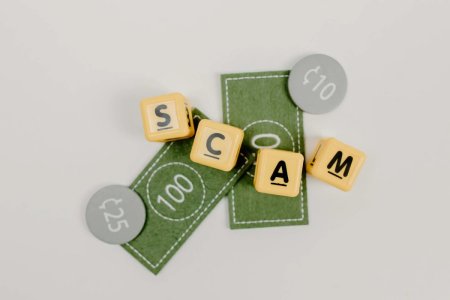A new phone scam is targeting seniors with fake health insurance deals—here’s what to know before you pick up
By
Veronica E.
- Replies 0
With healthcare costs rising and insurance plans growing more confusing, it’s no wonder many older Americans are open to hearing about better deals.
Scammers know this—and they’re taking advantage of it.
A new wave of phone scams is targeting older adults with phony offers for discounted health insurance.
These schemes are designed to sound helpful and official, but they often end with stolen personal information, unexpected charges, and no real coverage.
At The GrayVine, we believe in staying informed and looking out for one another.
Here's what this scam looks like, why it works, and how to protect yourself and your loved ones.

It usually starts with a phone call, text, or email.
The person on the other end sounds helpful, professional, and trustworthy.
They might claim they’re from a well-known insurance company—or even a government agency.
They say you qualify for a special plan with low monthly payments, extra perks, or guaranteed approval.
All they need is a little information to get started.
But it’s all a lie.
Once you give them your Medicare number, Social Security number, or bank details, they vanish.
Some people are charged for coverage that doesn’t exist.
Others don’t realize they’ve been scammed until they try to use the insurance—only to find out it’s worthless.
Scammers use a few common tricks to catch people off guard:
Unfortunately, these scams are far from rare. The FBI and FTC have documented thousands of cases across the country:
Scammers know that many seniors are navigating Medicare, retirement, and tighter budgets.
They also know that an unfamiliar call from someone sounding official can be hard to ignore—especially when it’s about something as important as health insurance.
That’s why older adults are among the most targeted—and why staying informed is so important.
The FBI and FTC recommend these steps to stay safe:
At The GrayVine, we believe staying informed is the best protection.
If something doesn’t feel right—trust your gut, hang up, and double-check.
Your peace of mind is worth it.
Read next: New warning for email users: The scam that tricks you into handing over control

Have you or someone you know been approached with a suspicious insurance offer? Do you have tips for spotting a scam? Sharing your experience could help others avoid becoming victims. Leave a comment below to keep the conversation going.
Scammers know this—and they’re taking advantage of it.
A new wave of phone scams is targeting older adults with phony offers for discounted health insurance.
These schemes are designed to sound helpful and official, but they often end with stolen personal information, unexpected charges, and no real coverage.
At The GrayVine, we believe in staying informed and looking out for one another.
Here's what this scam looks like, why it works, and how to protect yourself and your loved ones.

Staying alert to suspicious calls and offers can help protect your personal and financial information. Image Source: Pexels / Tara Winstead.
How the scam works
It usually starts with a phone call, text, or email.
The person on the other end sounds helpful, professional, and trustworthy.
They might claim they’re from a well-known insurance company—or even a government agency.
They say you qualify for a special plan with low monthly payments, extra perks, or guaranteed approval.
All they need is a little information to get started.
But it’s all a lie.
Once you give them your Medicare number, Social Security number, or bank details, they vanish.
Some people are charged for coverage that doesn’t exist.
Others don’t realize they’ve been scammed until they try to use the insurance—only to find out it’s worthless.
Also read: Scam alert—why your phone is suddenly getting fake job offers
What to watch out for
Scammers use a few common tricks to catch people off guard:
- Unsolicited contact: They call, text, or email you without warning.
- Urgency and pressure: You’re told you need to act fast before the deal disappears.
- Too-good-to-be-true offers: They may promise guaranteed coverage, no questions asked, or plans that cover everything.
- Requests for personal info: They often ask for your Medicare or bank information right away.
- No documentation: Victims are often left without proof of their plan—or receive vague paperwork that doesn’t hold up.
Real people, real consequences
Unfortunately, these scams are far from rare. The FBI and FTC have documented thousands of cases across the country:
- A couple in Pennsylvania was misled into buying a "national provider" plan that didn’t cover anything—leaving them on the hook after an ER visit.
- A man in Maryland paid for a full year of coverage up front but was left with a $7,000 bill after emergency surgery revealed his plan was fake.
- In Washington, a company called "Quick Health" received over 100 complaints for selling useless insurance and making unauthorized bank withdrawals.
Also read: Millions at risk: The crucial Google setting you need to check NOW to avoid a dangerous new phone scam
Why older adults are targeted
Scammers know that many seniors are navigating Medicare, retirement, and tighter budgets.
They also know that an unfamiliar call from someone sounding official can be hard to ignore—especially when it’s about something as important as health insurance.
That’s why older adults are among the most targeted—and why staying informed is so important.
Also read: Phone call from family? WAIT! Verify before you believe
How to protect yourself and your family
The FBI and FTC recommend these steps to stay safe:
- Verify the company: Use your state’s insurance commissioner website or the Better Business Bureau to confirm a company is real.
- Check with your doctor or provider: See if your provider accepts the plan before signing up.
- Don’t pay upfront: Never give money or sensitive details until you’ve seen and reviewed the full policy.
- Read everything carefully: Look for coverage limitations, exclusions, and fine print.
- Protect your personal info: Never share your Medicare, Social Security, or financial information with unknown callers.
- Report suspicious calls: Contact the FBI's IC3 (Internet Crime Complaint Center), the FTC, or your state insurance department if you suspect a scam.
What to do if you think you’ve been scammed
- Call your bank to stop payments or dispute charges.
- Report the scam to ReportFraud.ftc.gov and your state’s insurance commissioner.
- If your Medicare or Social Security number was shared, contact:
- Medicare: 1-800-MEDICARE (1-800-633-4227)
- Social Security: 1-800-772-1213
At The GrayVine, we believe staying informed is the best protection.
If something doesn’t feel right—trust your gut, hang up, and double-check.
Your peace of mind is worth it.
Read next: New warning for email users: The scam that tricks you into handing over control
Key Takeaways
- The FBI has issued an urgent warning about a growing scam involving fake discounted medical insurance plans offered through unsolicited calls and emails.
- Victims are left without real coverage, often losing thousands of dollars and unknowingly sharing sensitive personal information.
- Scammers frequently pretend to represent real insurance companies or government agencies to collect Medicare, Social Security, or bank details.
- The FBI recommends verifying companies through your state’s insurance department, reviewing policy documents before paying, and never sharing personal info with cold callers.
Have you or someone you know been approached with a suspicious insurance offer? Do you have tips for spotting a scam? Sharing your experience could help others avoid becoming victims. Leave a comment below to keep the conversation going.






